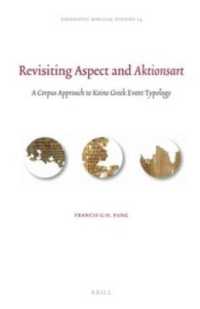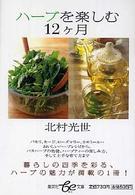- ホーム
- > 洋書
- > 英文書
- > Literary Criticism
Full Description
During the nineteenth and early twentieth century, women could not participate in the development of modern Hebrew literature. As pointed out in 1996's New Women's Writing from Israel, to which this is a successor volume, they could give vent to their poetic talents either in Yiddish, their spoken language, or in Russian, but not in Hebrew. While Yiddish writing did not insist on the national element as a required poetic norm, Hebrew literature did. The ideological dictum insisted on the symbiosis of the collective experience with the private, of the myth of the nation with the myth of the individual. Since women did not take part in public life or in the initial stages of the Hebrew revival which took place in Eastern Europe, they could not respond to these poetic demands. In the 1920s, Hebrew prose was more open to autobiographical and confessional writing, and women were able to contribute to this genre, as they could incorporate the full range of their experience. On the whole they were not provocative in their writing and cannot be defined as 'feminist' writers. They did not strive to differentiate themselves from male writing, but rather to complement it. It was only with the next generation of writers, the 'New Wave' writers of the 1960s and 1970s, that women's prose writing found its niche. The shift of marginal characters to the central stage in Israeli fiction, as well as the departure from the male-orientated national concerns, opened the doors to an influx of women writers. The change in the mainstream Israeli experience meant greater openness in literature, and a pluralism of voices emerged, incorporating those of women writers. As a result, they could, at last, abandon their traditional place in Hebrew literature and assume their rightful role in its development. This poetic stance changed in the 1980s. Although women writers did not overtly call for sexual equality, they exposed erotic feelings and emotions which are exclusively feminine, and which their predecessors were too inhibited to express. Furthermore, we hear for the first time the voices of women who express their experience of religious life. Either from within Jewish orthodoxy, or more often having left this world, they offer us a glimpse into this hitherto unknown literary terrain. Interestingly, many still use the marvellous genre of the short story. Contemporary Israeli Women's Writing reflects these dramatic changes.








